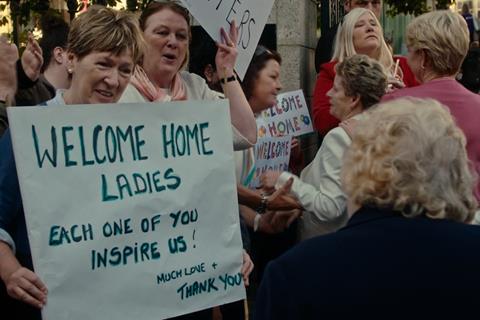Director Aoife Kelleher follows attempts to bring real and lasting justice to the women involved

Dir: Aoife Kelleher. UK/Ireland. 2025. 105mins
Ireland’s Magdalene Laundries and Mother And Baby Homes – the state-sanctioned, Catholic-run institutions in which thousands of homeless women and children were housed (or, more accurately, incarcerated) – have been the subject of multiple films over recent years. Now documentary Testimony moves the story on, centering on the attempts of the Justice For Magdalene (JFM) advocacy group to hold the Irish government accountable, and to provide redress to the thousands of women, alive and dead, who were ensnared in this system. Raw, powerful and shot through with anger and defiance, this respectful, damning film gives a platform to survivors, who tell their stories with clarity and bravery.
Shot through with anger and defiance
Testimony, which is narrated by Imelda Staunton and supported by the BFI and Screen Ireland, opens in the UK on November 21 after premiering at the Dublin International Film Festival where it won the ICCL Human Rights award. Joining the ranks of features as diverse as Small Things Like These, The Devil’s Doorway, The Magdalene Sisters and Philomena, the film brings a renewed sense of urgency and resonance to this issue. Director Aoife Kelleher uses the same intimate approach she demonstrated in 2024 documentary Mrs Robinson, about the first female president of Ireland. This follow-up should draw a modest theatrical audience before finding its legs with a streamer or broadcaster. It could also be used as a potent tool for education and advocacy.
The film begins in 2013, as the Irish government finally admits the state had been involved in the running of the Magdalene Laundries, but – initially at least – failed to formally apologise or offer compensation to the women involved. The JFM group, established by Angela Newsome, Claire McGettrick and Mari Steed in 2003, vowed to continue to fight. Their ranks include human rights lawyer Maeve O’Rourke, who, like everyone embedded in this long campaign for justice, carries this issue deep in her soul, fury and heartbreak informing every impassioned speech she makes on behalf of women who have been silenced for decades.
Of course, Testimony’s most important element is firsthand interviews with many women who experienced the Magdalene Laundries or Mother And Baby Homes – the latter of which facilitated the trafficking of children to foster families in the UK, US and beyond. They include those who were locked up and forced to work as children; mothers separated from their babies; and women fostered out of the country as infants. Despite the intense personal horrors of these experiences, recollections are eloquent and measured. These are difficult stories to tell, but they absolutely need to be heard.
The Irish government, however, seems reluctant to hear these women. After years of insisting it had no case to answer, under pressure from JFM – and, eventually, the UN – it commissioned a report on the Magdalene Laundries, for which survivors were subjected to daunting one-on-one cross-examinations. That was published in 2013 and, while the government did eventually apologise and offer financial compensatio, it continues to remain tight-lipped about the heinous practices of the Mother and Baby homes. That’s despite overwhelming evidence of wrongdoing, including the discovery of mass infant and child remains in the septic tanks of former homes, and paperwork linking mother and baby vaccine trials to pharmaceutical giant GlaxoSmithKline. Yet a 2021 government report into the homes found little evidence of abuse. “Women’s testimony has no evidential value,” notes O’Rourke.
Against this bureaucratic stonewalling, JFM marches on, determined to bring justice to the women who were blamed for so long – by the government, by the church, by society – for the inhumane situations in which they found themselves trapped. A deeply moving, bittersweetly euphoric sequence in which Magdalene survivors meet in Dublin to be honoured at a special lunch, crowds of onlookers cheering their arrival, highlights just how important it is that Ireland fully confronts, understands and makes dignified amends for this national shame. Only then can these women truly find peace.
Production companies: Underground Films, Rocliffe
International sales: Underground Films, info@undergroundfilms.ie
Producers: Farah Abushwesha, Rachel Lysaght
Cinematography: Eleanor Bowman
Editing: Emer Reynolds
Music Tom Hodge















![[L-R]: Amanda Villavieja, Laia Casanovas, Yasmina Praderas](https://d1nslcd7m2225b.cloudfront.net/Pictures/274x183/6/4/1/1471641_pxl_20251224_103354743_618426_crop.jpg)








